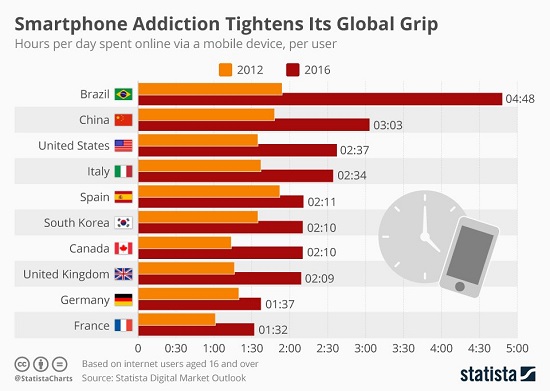What's Left to Monetize?
July 5, 2019
What's left to monetize? It appears the answer is "very little."
Advertising has always monetized consumers' time and attention, what we call engagement today. Newspapers and periodicals publish advertisements, radio/TV networks and stations air adverts, movie theaters run trailers/ads, billboards occupy our mental space while driving and websites and apps post adverts. The more media you consume, the more adverts you see/hear, and the more time you spend consuming media, the greater your exposure to advertising.
Monetizing our time and attention has a long history, as does the monetizing encroachment on what was once private time / attention. Time spent on the telephone escaped monetization until the advent of telemarketing, a particularly invasive and galling conquest of what was once a private domain. Now thanks to voicemail and robo-calling, our phones are increasingly the domain of intrusive monetization. (Is anyone else getting endless voicemails pitching services in Mandarin Chinese?)
No visual space has been left unmonetized: shopping carts display adverts, the plastic dividers between customers' groceries in the checkout display adverts, even the floors of stores display adverts.
Many forms of communication have been rendered essentially unusable by monetization. Many people no longer look at their email since it has been taken over by spam, and many of those with landline phones no longer answer their phones due to the constant robo-calls.
Big Tech has generated billions of dollars by monetizing other forms of engagement and privately owned capital/assets. Google has monetized web search, Facebook, Twitter and Instagram have monetized social media, Uber and Lyft have monetized privately owned vehicles, as are on-demand delivery services (Grubhub, DoorDash, Uber Eats) and Amazon. AirBNB has monetized privately owned or leased homes and flats.
Many startups have attempted to monetize other privately owned assets ("it's Uber for bicycles," etc.) with varying results.
The spare time of the under-employed or unemployed has been monetized by Task Rabbit, Fiverr, et al.
As has been widely noted, the net income paid by the monetizing platforms to the owners/providers does not fully compensate costs of ownership or match conventional wages and labor benefits. The benefits of monetizing what was previously unmarketable--a few hours of driving one's own car or performing paid work on a flexible schedule--are obvious, as is the profit potential of controlling the marketplaces of buyers and sellers of these services.
So here's my question: what's left for Big Tech to monetize? Many people already spend more time staring at screens (i.e. "leisure" consumption of media, entertainment, gaming, etc.) than they do at work or school, so in terms of time left to monetize, Hulu, Apple Music, Spotify, Netflix et al. are competing with sleep, meal preparation, reading books, conversation, dinner parties, intimacy and other traditional forms of non-media, non-screen uses of time.
As for privately owned capital/assets, there's a marketplace for sharing or renting privately owned consumer goods, but in a society awash in "stuff" it's difficult to monetize low-value, often informal activity.
So what happens to the lofty valuations currently enjoyed by Big Tech as the asymmetries of monetization start moving political gears and the gold-rush of monetizing engagement and privately owned assets runs out of new territories to conquer? What happens when diminishing returns set in as growth rates slow, marginal costs rise and political blowback builds momentum?
Just as there are only so many hours of the day consumers can stare at screens, so too are there limits on monetizing engagement and privately owned assets. What's left to monetize? It appears the answer is "very little."

Pathfinding our Destiny: Preventing the Final Fall of Our Democratic Republic
($6.95 ebook, $12 print, $13.08
audiobook):
Read the first section for free in PDF format.
My new mystery
The Adventures of the Consulting Philosopher: The Disappearance of Drake
is a ridiculously affordable $1.29 (Kindle) or $8.95 (print);
read the first chapters
for free (PDF)
My book
Money and Work Unchained is now $6.95 for the Kindle ebook and $15 for the print edition.
Read the first section for free in PDF format.
If you found value in this content, please join me in seeking solutions by
becoming
a $1/month patron of my work via patreon.com. New benefit for subscribers/patrons:
a monthly Q&A where I respond to your questions/topics.
NOTE: Contributions/subscriptions are acknowledged in the order received. Your name and email remain confidential and will not be given to any other individual, company or agency.
|
Thank you, Charles R. ($200), for your beyond outrageously generous contribution to this site-- I am greatly honored by your steadfast support and readership. |

|